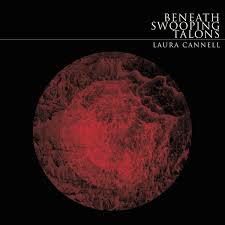Laura Cannell’s Quick Sparrows Over The Black Earth seemed to emerge from nowhere last year, or rather, it seemed to have burrowed up from the earth of her native East Anglia, breaking out into the light after centuries buried in an ancient, yet somehow timeless, vault. Her instruments are traditional: fiddle and recorder, and even her approach to both has echoes of medieval tradition, and yet the music on her solo debut sounded as fresh and innovative as it was steeped in history and tradition. Add in the strangeness of the album, its intangible evocation of folkish mysteries and the stark landscapes of East Anglia’s coasts, and it was debut overflowing with beauty to engage the mind and soul. Less and the year later, Cannell repeats the trick with her follow-up, Beneath Swooping Talons, and even takes the promise of her magnificent debut to fresh heights.
Cannell draws on many of the same sources as on Quick Sparrows Over the Black Earth, including medieval folk, and utilises the same techniques of over-bowing (loosening the strings on her bow so as to pass it over the neck and create a denser, drone-heavy sound) or playing two recorders simultaneously, but it feels both more evocative and more abstract. Music this deeply rooted in landscape can’t help but be, for want of a better word, psychogeographical, with the title of the opening track, ‘All The Land Ablaze’, setting the scene of a blazing sunrise over the flat, wide spaces of Cannell’s native Norfolk. The swooping talons of the album’s title itself introduce a sense of threat and menace into the music’s innate pastorality, hinting at the natural violence that lurks on the flipside of the countryside’s bucolia.
On Beneath Swooping Talons, the traditional folk that forms the core DNA of Laura Cannell’s music feels less anchored in time, the artist instead stretching through the ages to tie together the past and the modern drone movement of a Tony Conrad or, more strongly, Henry Flynt. Flynt is famous for his avant-garde take on traditional American hillbilly music, and whilst Cannell’s is too esoteric to draw an effective parallel, she nonetheless works to a similar ethos. So, whilst a broad swathe of Beneath Swooping Talons conjures up the past with almost archeological vividness, and dips into the Ewan MacColl/Anne Briggs folk vernacular, it is also part of drone and minimalist continuum that remains modern and forward-thinking. It’s all the more remarkable when you consider that the techniques mentioned in the previous paragraph are drawn from medieval times, but in Laura Cannell’s hand, pieces like ‘For Sorrow Salt Tears’, ‘Deers Bark’, ‘Be Not Afeard’ and ‘Cathedral Of The Marshes’ take the emotional resonance of folk and refract it into wider, more abstract psychological and musical realms.
In the case of the fiddle pieces, this curious juxtaposition results in pieces that are stark and brooding, the rough bow often jarring angrily against the strings -and one can almost hear the rosin crumbling onto the instrument’s body-, but equally imbued with a pathos that throws mournful track titles into sharp relief. The recorder pieces are more sparse and ambiguous, the contrast between tenor and soprano recorders creating melodies that flow and counter-flow against one another in tenuous harmony. On her previous album, Cannell recorded live in old, empty churches, and Beneath Swooping Talons maintains that work’s spiritual colourations, albeit in a less overt manner. She still recorded all these pieces in one take, taking inspiration from traditional tunes and reworking them through improvisation until they became entirely hers, preserving their atavistic power whilst modernising them through the prism of her emotions and perceptions of the world in 2015. If this approach is not a brand new one, few (Jessika Kenney, maybe?) have achieved such magisterial results, and Beneath Swooping Talons stands as an essential work of modern British folk and avant-garde composition.
<div class="fb-comments" data-href="http://thequietus.com/articles/18502-laura-cannell-beneath-swooping-talons-review” data-width="550">


